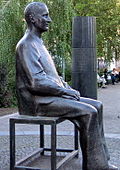- Der Jasager
-
Der Jasager (literally The Yes Sayer also translated as The Affirmer or He Said Yes) is an opera (specifically a Schuloper or 'school-opera') by Kurt Weill to a German libretto by Bertolt Brecht (after Elisabeth Hauptmann's translation from Arthur Waley's English version of the Japanese Nō drama Taniko).
Its companion piece is Der Neinsager (He Said No) although Brecht's other text was never set by Weill.
Weill also identifies the piece, following Brecht's development of the experimental form, as a Lehrstück, or 'teaching-piece'.[1]
Contents
Performance history
It was first performed in Berlin by students of the Akademie für Kirchen und Schulmusik at the Zentralinstitut für Erziehung und Unterricht on 23 June 1930 and broadcast simultaneously on the radio. It was successful and there were over 300 performances during the following three years.
Brecht subsequently revised the text twice, the final version, including Der Neinsager, being without music.
Roles
Role Voice type Premiere Cast,
23 June 1930
(Conductor: Kurt Drabeck)The boy treble The mother mezzo-soprano The teacher baritone Otto Hopf First student treble or tenor Second student treble or tenor Third student treble or baritone Sources
- Amadeus Almanac, accessed 31 October 2008
- Hinton, Stephen. 1992. "Jasager, Der". In The New Grove Dictionary of Opera. Ed. Stanley Sadie. London:. ISBN 0-333-73432-7.
- Weill, Kurt. 1930. Interview. In Collected Plays: Three by Bertolt Brecht. Ed. and trans. John Willett. Brecht Collected Plays Ser. London: Methuen, 1997. ISBN 9780413704603. p.334-335.
References
- ^ Weill says: "In Lindbergh's Flight Bert Brecht and I had the schools in mind for the first time. I am hoping to develop this direction further in my latest play, the 'Lehrstück' He Said Yes. [...] I no longer want to offer 'songs' so much as self-contained musical forms. In the process I want to take over whatever I hitherto found right, like what I once termed the gestic approach to music. The melody must give clear expression to the gest. It is clarity, not lack of clarity that has to prevail in all that the composer wishes to express. And [...] this 'Lehrstück' has to be a fully authentic work of art, not a secondary piece." (Weill 1930, 334).
Works for the stage by Kurt Weill Der Protagonist (1926) · Mahagonny-Songspiel (1927) · Der Zar lässt sich photographieren (1928) · The Threepenny Opera (1928) · Happy End (1929) · Der Lindberghflug (1929) · Rise and Fall of the City of Mahagonny (1930) · Der Jasager (1930) · Die Bürgschaft (1932) · Der Silbersee (1933) · The Seven Deadly Sins (1933) · Der Kuhhandel (1935) · Johnny Johnson (1936) · The Eternal Road (1937) · Knickerbocker Holiday (1938) · Lady in the Dark (1940) · One Touch of Venus (1943) · The Firebrand of Florence (1945) · Street Scene (1946) · Down in the Valley (1948) · Love Life (1948) · Lost in the Stars (1949)Categories:- Operas by Kurt Weill
- Plays by Bertold Brecht
- Lehrstücke by Bertolt Brecht
- German-language operas
- Operas
- 1930 operas
Wikimedia Foundation. 2010.

